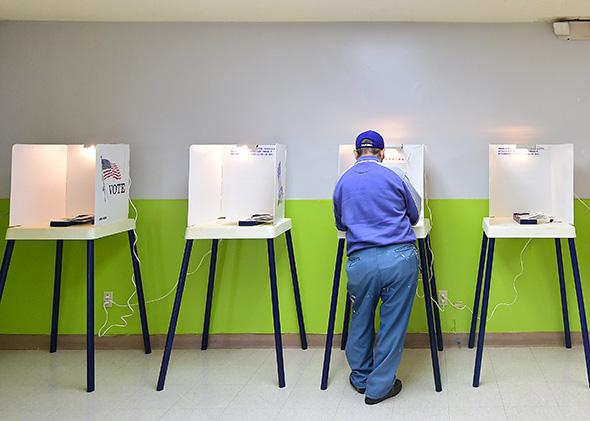We’re a little more than a month into the new Congress, and already Republicans have made it clear that the next two years are going to be painful ones for anyone who believes in the scientific reality of man-made global warming. The Senate went on record last month that it doesn’t think humans are even contributing to climate change. The attitude in the House, meanwhile, is even more hostile to science, as GOP leaders there are hard at work plotting ways to undercut President Obama’s climate rules.
Given the depressing reality of the present, the climate-conscious are left looking to the future for signs of hope. And there are reasons to be optimistic! As the Yale Project on Climate Change Communication documented last month, there is a pretty big chasm between the climate views of Republican voters and Republican lawmakers. After crunching the numbers on a half-dozen national surveys from the past three years, the Yale researchers found that more than half of self-identified Republicans (56 percent) actually support government regulations on carbon dioxide—a rather staggering conclusion when you consider the anti–Environmental Protection Agency venom that GOP lawmakers and White House hopefuls alike have been spitting for years.
Team Green got another dose of promising news earlier this week from the New York Times, which used its recent climate poll—conducted last month with the help of Stanford University and a nonpartisan environmental research group—to highlight another relatively unknown and largely untapped pocket of support for climate action: Hispanics. Despite the common notion that the environment is something that only rich, white liberals care about, the Times survey found that Hispanics are actually more likely than non-Hispanic whites both to view climate change as something that affects them personally and to support government action aimed at curbing it. Via the Times:
The findings in the poll could have significant implications for the 2016 presidential campaign as both parties seek to win votes from Hispanics, particularly in states like Florida and Colorado that will be influential in determining the outcome of the election. The poll also shows the challenge for the potential Republican presidential candidates—including two Hispanics—many of whom question or deny the scientific basis for the finding that humans caused global warming.
If you dig down into the polling splits a little more, that apparent challenge for GOP candidates only grows. Hispanics and non-Hispanics alike were read three statements that a presidential or senatorial candidate might deliver from the stump and were asked whether that position would make them more or less likely to vote for the candidate. The clear-cut winner said that human-driven climate change is happening and the government should act to combat it. Two-thirds of respondents and nearly half (48 percent!) of Republicans said that would make them more likely to vote for the candidate while only 12 percent overall and 24 percent of Republicans said that would make them less likely to vote for him. The other two statements—one that called man-made climate change a “hoax” and one that was a version of the GOP’s “I’m not a scientist” defense—did considerably worse among both the general population and Republicans.
All of that is undeniably good news for the climate crowd. But here’s where the dreaded dose of reality comes in: There’s nothing to suggest that when Americans enter the voting booth in 2016 they will decide which lever to pull based on those climate views. Yes, all things being equal, Americans say they would prefer to vote for someone who believes the science that tells us man-made global warming is real and who thinks the government should actually do something to try to slow it. But all things are never equal. Voters have, time and time again, proved that climate isn’t a make-or-break issue for them. In a Pew Research Center poll last month, global warming came in second from the bottom on a list of Americans’ 23 top policy priorities for 2015—a full 10 points behind addressing the country’s “moral breakdown.”
That could very well change in the future as more and more Americans feel the effects of climate change firsthand. But as 2014 showed us once again, a majority of voters may say that they care about slowing climate change, but they don’t yet care enough to force Washington to actually do anything about it. Until that changes, don’t be surprised when GOP hopefuls in 2016 and beyond are out of step with the voters they covet. When those voters don’t care enough, candidates don’t have to care at all.
